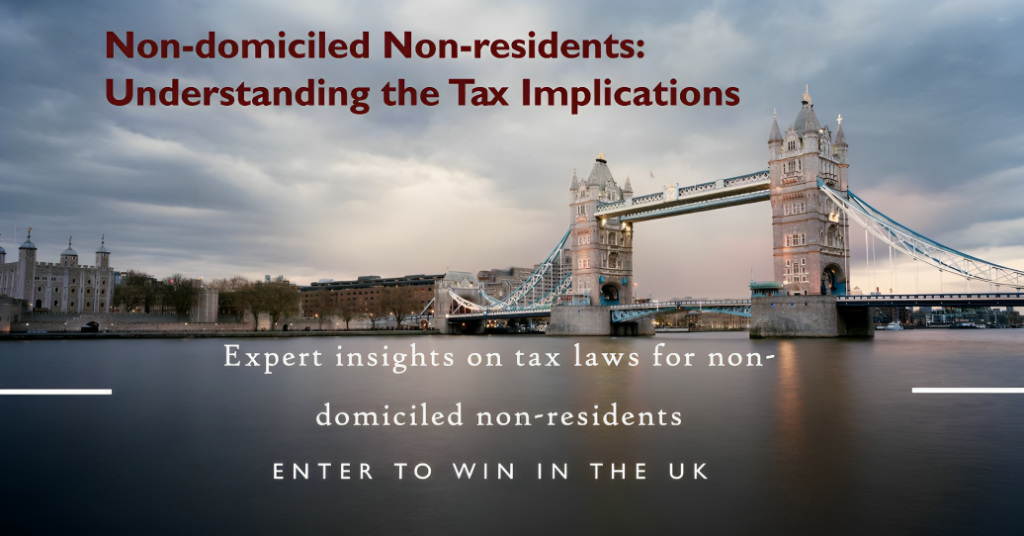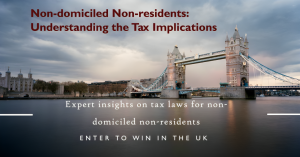Taxation in the UK is a complex system especially for those who fall into the category of being non-domiciled and non resident tax. This article provides an exhaustive understanding of the tax framework for non domiciled non residents elucidating the various facets obligations advantages and strategic considerations.
Defining Non-domiciled Non-Resident Status
Non-resident: Such an individual spends fewer than 183 days in the UK during a tax year and lacks substantial ties like a home or family in the UK
Non-domiciled: An individual is non-domiciled if their permanent home domicile is outside the UK. Even if they reside in the UK for long durations. They might still be considered non domiciled if they intend to return to their home country.
Tax Implications for Non-domiciled Non residents
Generally, UK taxes are levied based on residency and domicile status. Here’s how non-domiciled non-residents are affected:
Income Tax: Non-resident individuals are usually only taxed on UK-sourced income. This includes earnings from employment in the UK, rental income from UK properties, or income from a business operated in the UK. Foreign-sourced income is usually not taxable unless remitted to the UK.
Capital Gains Tax (CGT): Non-residents are typically not liable for CGT on assets outside the UK. However, gains on UK residential property and certain assets of a UK branch of a foreign business may be subject to CGT for non-residents.
Inheritance Tax (IHT): Non-domiciled non-residents are typically only liable for IHT on their UK-situated assets, such as properties or bank accounts within the UK. Assets situated outside the UK are generally outside the scope of UK IHT.
Tax Reporting for Non-domiciled Individuals
All non-domiciled individuals, regardless of residency must ensure accurate reporting of their global income and gains. Even if they choose the remittance basis of taxation. This involves:
- Detailing all foreign income and gains.
- Providing a comprehensive report on income remitted to the UK if on the remittance basis.
Non-dom Tax Status in the UK
The UK’s unique approach allows non-doms the option to pay tax in one of two ways:
- Arising Basis: Paying tax on worldwide income and gains.
- Remittance Basis: Paying tax only on the income or gains brought into the UK, which could attract a charge if one has been a UK resident for a long duration in the previous years.
Pre-entry Tax Planning for Non-domiciled Individuals
Before arriving in the UK, non-doms should:
- Organise their financial affairs to minimise tax liabilities.
- Consider setting up trusts or other structures to shelter non-UK assets from UK taxation.
- Review potential sources of UK income and the tax implications.
- Understand their residency status and the associated tax implications.
Tax Planning for Non-doms Arriving in the UK
Effective tax planning can help non-doms arriving in the UK in managing their tax liabilities:
- Plan the timing and method of remittances to minimize taxation.
- Consider segregating clean capital from foreign income and gains to facilitate untaxed remittances.
- Evaluate the benefits of claiming the remittance basis versus the arising basis.
Non-domiciled Tax Benefits and Obligations
Benefits:
- Potential to claim the remittance basis, possibly resulting in significant tax savings.
- Exemption from UK tax on non-UK sources of income and gains, unless remitted.
- Access to Business Investment Relief, which can allow tax-free remittances for investments in UK companies.
Obligations:
- Detailed record-keeping, especially for those on the remittance basis.
- Ensuring compliance with UK tax return deadlines and requirements.
- Being aware of changes in UK tax laws and how they might affect one’s non-dom status.
Additional Considerations
- The Statutory Residence Test: The Automatic Overseas Test can determine one’s residency.
- Record Keeping: Crucial for accurate tax reporting.
- Double Taxation Agreements (DTAs): The UK has numerous DTAs, ensuring non-doms don’t face double taxation.
Note: Given the complexity and evolving nature of tax laws, consulting with a tax professional specific to individual circumstances is always recommended.
How We Save Property Tax Can Help?
At We Save Property Tax, we’re here to guide you through Non-Domiciled, Non-Resident UK Tax. Our experienced team at We Save Property Tax is committed to helping you reach your financial goals while staying within the law.
Discover Your Savings Potential with a Free Initial Consultation.
Here’s the exciting part: we offer a free initial consultation tailored to you. In this session we will:
- Assess your financial situation.
- Show you how to save on taxes.
- Answer any questions you have about your non-domicile status.
Imagine the savings and benefits that await. Don’t miss this chance to tap into the expertise of professionals who have helped many in the world of Non Domiciled Non Resident UK Tax.
Unlock Tax Savings – Book Your Free Consultation Now
Our goal is to empower you with knowledge for a better financial future. To book your free initial consultation fill out the contact form below. It’s a risk free way to take control of your finances.
Conclusion
For non-domiciled non-residents. the UK tax system can seem daunting. With a thorough grasp of its principles and by staying informed. One can effectively navigate their tax responsibilities and exploit potential advantages.










